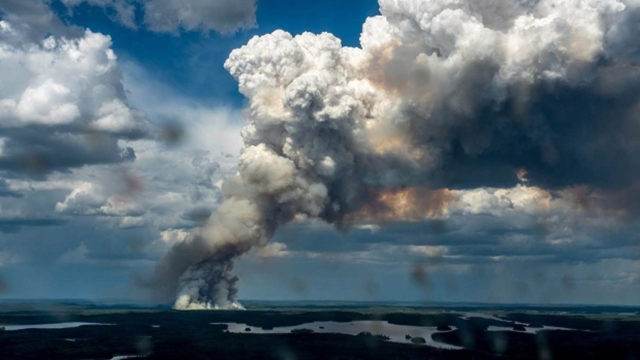Armed Forces called in as thousands flee Saskatchewan wildfires – Province-wide wildfires blanket B.C. communities in smoke
5 July 2015 (CBC News) – More than 50 new wildfires have sprung up across British Columbia over the weekend, putting people out of their homes or on evacuation alert, resulting in several communities declaring states of emergency. Smoke from the fires cast an early morning haze over Vancouver and an eerie pall over Victoria on Sunday. Ash was reported falling on buildings and cars in several areas from Horseshoe Bay to Vancouver. Three of the new fires are in the Kootenays in southeastern B.C., where an evacuation alert has been issued for about 350 homes along Highway 3A between Sitkum Creek and Willow Point. The 150-hectare lightning-caused fire is visible from the town of Nelson. Two other fires are also burning in the Kootenays.
An evacuation order affecting about 150 people In Kragmont has been issued for the 200-hectare Baynes Lake wildfire near Highway 93 southeast of Cranbrook. The fire is believed to have been caused by lightning as well. A smaller 50-hectare fire, the Spilmacheen wildfire, is burning north of Highway 95 between Harrogate and Brisco. It could have also been caused by lightning, but officials are still investigating. An evacuation order in effect for the Huckleberry fire burning in Joe rich east of Kelowna has now been lifted for all but 30 properties. That fire, which had been at 80 hectares, is now completely contained. [more]
Province-wide wildfires blanket B.C. communities in smoke 
4 July 2015 (CBC News) – The military has been called in to help care for 7,900 people from a northern Saskatchewan community that includes the province’s largest First Nation, as a rash of wildfires prompts a massive evacuation. Up to 5,000 of the evacuees will be taken hundreds of kilometres away to a refuge in Cold Lake, Alta., staffed by the Canadian Forces and the Red Cross. After the wildfires crossed fail-safe lines Saturday, coming within eight kilometres of the community of La Ronge, the provincial government and the Lac La Ronge Indian Band began evacuating out 7,900 residents remaining in the area. In a conference call with media Saturday afternoon, Saskatchewan Premier Brad Wall confirmed he spoke with Prime Minister Stephen Harper, who promised support in dealing with the shifting blazes. “The prime minister was very accommodating and willing to make sure that, upon official request, the resources are there,” Wall said. “There might be some other need for Canadian Forces personnel, especially to help with what are significant logistical demands as result of a very large general evacuation.” Saskatchewan’s provincial fire commissioner issued the evacuation order for the La Ronge area, following a similar advisory earlier in the day from the Lac La Ronge Indian Band. The affected area includes La Ronge, Air Ronge and the Lac La Ronge Indian Band — a zone located about 200 km north of Prince Albert. The number of people affected is greater than the headline-grabbing 2011 evacuation of Slave Lake, Alta., where a wildfire forced 7,000 people from their homes. “This evacuation has been triggered by a number of wildfires in the area, which are blowing smoke and particulate matter into and around the communities,” a statement from the provincial fire commissioner reads. [more]
Saskatchewan wildfires force nearly 8,000 people out of homes
